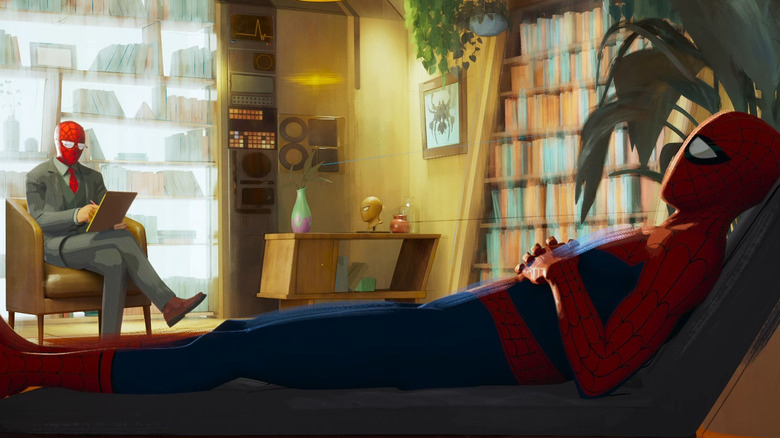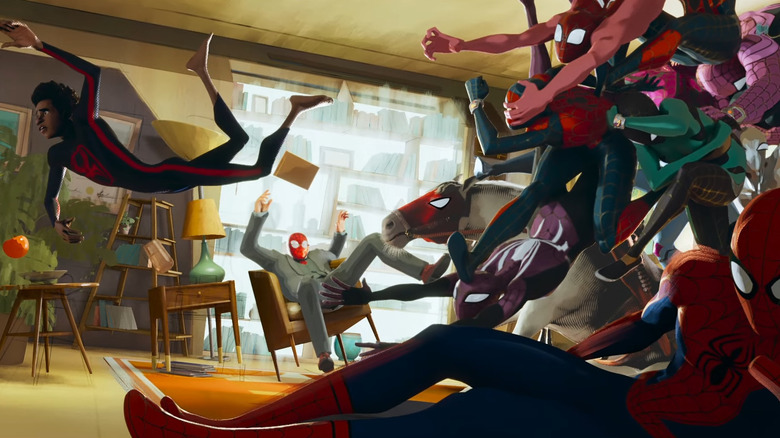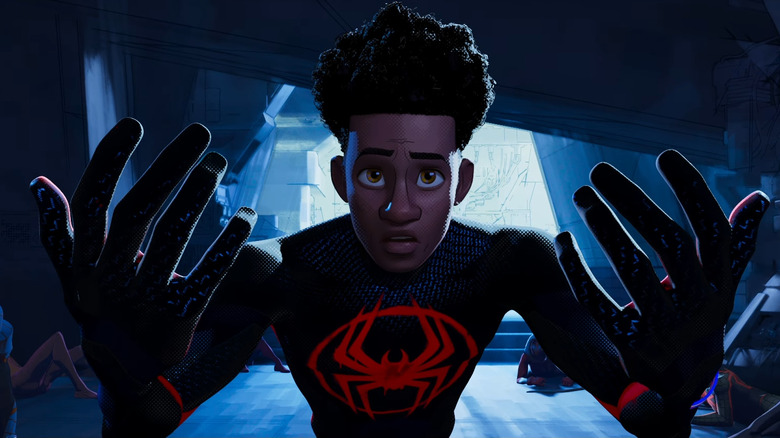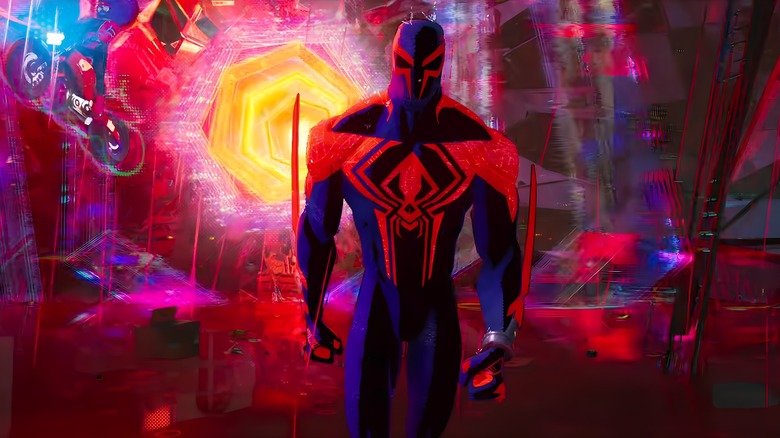The Cliffhanger Ending Of Spider-Man Across The Spider-Verse Is A Big Bummer
This post contains major spoilers for "Spider-Man: Across the Spider-Verse" and "Fast X."
It may be difficult to discuss the new animated dazzler "Spider-Man: Across the Spider-Verse" because, well, it's not finished. The film ends on a cliffhanger ending, yes, but in execution, it's not in a traditional sense. Earlier this year, the film "Fast X" also ended on a cliffhanger, where it looked as if most of the central cast had died, and the hero Dom (Vin Diesel) was trapped at the foot of a dam that was about to explode. "Fast X," however, was a light adventure film with few ideas in its head and a panicked, earnest need to entertain audiences through utterly ridiculous action set pieces.
"Across the Spider-Verse" is far more ambitious than that. It doesn't merely aim to thrill, but to explore the meaning of Spider-Man and interrogate the notion of superhero origin stories in general. Indeed, "Across the Spider-Verse" raises a few tantalizing and intriguing questions about the value of superhero canon, eventually proposing the thesis that Spider-Man's free will and inherent sense of righteousness can suffice for superheroism, and not a belabored backstory rife with grief, guilt, and personal tragedy. Spider-Man wouldn't be Spider-Man if he didn't watch his Uncle Ben die in front of his eyes. But when one is exploring a multiverse of hundreds of Spider-People, does that mean hundreds of Uncle Bens, and Captain Stacys, had to die? Miles Morales (Shameik Moore) argues that this doesn't need to be the case and that heroism needn't be leavened by tragic fatalism. It's a great idea to insert into any superhero movie.
But then there's a late-film twist that contradicts that. All of a sudden, it seems fatalism may come into play after all. And, sadly, the film can't follow through on its own counterpoint because, well, it just ended.
To elucidate...
To explain a little more in-depth:
One of the central antagonists of "Across the Spider-Verse" is Spider-Man 2099 (Oscar Isaac), one of the leaders of a vast network of interdimensional Spider-People. Most dimensions, it seems, have their own version of Spider-Man, with each one having been bitten by a radioactive spider, and each one having experienced the death of a loved one as a motivating factor to become a superhero. Spider-Man 2099 can see through time and knows when a new Spider-Man is about to experience said origin story. He wisely stays back, allowing Captain Stacy, or their equivalent to die. He then scoops up the resulting Spider-Man and adds to the Spider-Society's ranks.
In a cute meta-joke, Spider-Man 2099 refers to this fatalistic origin story as "a canon event," in that: this is comic book canon, and it cannot be altered. His voice echoes that of bitter, nitpicky nerds everywhere who cannot abide alteration from a very specific set of story parameters in their superhero storytelling. Yes, Spider-Man 2099 is a villain. This criticism of people who hate deviation from canon is salient and clever.
When Miles Morales rescues a certain Spider-Man's Captain Stacy, however, he creates a literal plot hole. A gigantic aperture forms in space-time, and the Spider-People rush in to solve the problem. It's here that Miles is called aside by Mr. 2099 and told all the rules.
Miles is, naturally, aghast. When one considers how many Captain Stacys have to die to make heroes, one begins to see tragedy not as a personal time of loss, but as a vast network of blood sacrifices. Is it worth having an army of Spider-Men if others have to die to create them?
Miles' free will
By the rules of "Across the Spider-Verse," interrupting canon is a disaster, and Spider-Man 2099 has spent his life trying to preserve it. Miles, however, doesn't agree, feeling that abiding by canonical rules is a limited way of thinking. He declares that he'll make it on his own and write his own story, thank you very much. There is, he feels, more than one way to be Spider-Man. Unlike Mr. 2099, Miles declares that he has free will and that fatalistic thinking is a trap.
That scene happens, however, only two-thirds of the way through the film, and the story begins to spin off in wild directions, wholly separate from any notions of fatalism vs. free will. Some of these wild directions are much-appreciated breaks, as when Spider-Woman (Hailee Steinfeld) confesses to her father that she's secretly been a superheroine for years. The emotional beats of scenes like that perfectly leaven the mayhem in the film's extensive action sequences.
It's when we come to the cliffhanger ending that things get muddy. Miles uses a high-tech sci-fi device to return to his home dimension, resolute in his free will.
But, because the spider that initially gave him his superpowers years before was from another dimension, he returns to the spider's dimension — Earth-42 — and not his. Earth-42 is, it seems, a crime-ridden hellscape. New York is a dystopia. Miles finds that his late uncle (Mahershala Ali) is still alive in this universe, but that his very alive father (Brian Tyree Henry) is dead. The radioactive spider that was destined to make a Spider-Man on Earth-42 accidentally slipped through a portal and bit Miles instead. Earth 42's Spider-Man, then, never existed, and the world came to ruin.
So it is about fatalism, after all, it seems.
Was Spider-Man 2099 right?
Without a Spider-Man to protect the world, everything goes to Hell. Additionally, Miles finds that, without a Spider-Man to fight crime, he himself will be dragged into the criminal underworld. On Earth-42, Miles has become the supervillain known as the Prowler. Miles thought he had free will, but it seems he doesn't. But for a flick of circumstance, Miles became a supervillain. It seems his righteousness doesn't always have a place in the multiverse.
"Across the Spider-Verse" had already presented its themes of fatalism vs. free will quite nicely, cleverly staging them as a pop media interrogation. Superhero origin stories are banal, the film seems to say, and bucking trends is cathartic and creative, and allows genuine, good-hearted human righteousness to thrive beyond the mind-numbing trap of well-worn writing tropes. But then, right at the last minute, it presents a counterpoint. It suddenly argues that bucking trends is not good. Creating Spider-Man is necessary, as not doing so results in the corruption of honest kids like Miles.
Had the film ended with a speech about fatalism and about how Miles was wrong, then the themes might have come together, albeit darkly. Or, had the film continued, allowing the two moral opposites to fight for dominance, then the film would have come to a thematic conclusion. But neither of those things happens, though. The film ends abruptly.
A cliffhanger ending is fair game for screenwriters and incomplete stories can work well (cit. "The Empire Strikes Back"). The bigger issue with "Across the Spider-Verse" is that its themes don't conclude. As such, the film feels vitally incomplete. I can't tell you what "Across" is about because it presented two sides of an argument and left them both unsatisfactorily uninterrogated.
"Beyond the Spider-Verse" opens in March of 2024. The actual ending coming forthwith.



